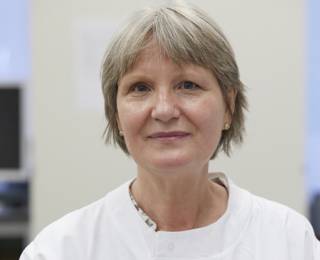Group Leader: Professor Sibylle Mittnacht
Professor of Molecular Cancer Biology
Fellow of the Royal Society of Medicine (RSM)
Research summary
A question with fundamental relevance to cancer biology is what determines whether cells (which form the building blocks of tissue including cancer) divide or cease to divide.
The stringent control of cell division is a prerequisite for the precise formation of organs and body organization during embryonic development as well as tissue renewal and tissue maintenance thereafter. In normal tissue cell division is confined to a small group of tissue cells that in an externally controlled manner produce progeny that have limited division capacity and finally enter a state of terminal division incapacity or die. A defect in this control is elementary to the development of cancer and found in cancer cells of all cancer types. Because of such defects cancer cells enter division independent of external control and remain proliferation active under conditions where normal cells are unable, or cease, to divide. Loss of division control is critically important for the ability of cancers to expand at their primary site as well as for the ability of cancer metastasis to establish following spreading of individual cancer cells to remote tissues.
We are trying to understand the molecular machinery required for cells to enter the cell division cycle and the mechanisms that leads cells to cease division activity transiently and terminally. Our efforts include investigating if and how such understanding may be exploited for the therapy and cure of cancer and how the molecular machinery impacts therapeutic outcome following conventional and targeted cancer therapeutic intervention. Our research uses a combination of molecular, cell and biochemical technologies, including cell-based high contend screens using chemicals and RNA interference-mediated gene- knock- down, molecular engineering, proteomics and enzyme activity assays.
Research projects
The decision whether to enter cell division arises in the GAP1 (G1) phase of the cell cycle and normally required stimuli from the external environment. Once the decision is made the cell progress through the division cycle generating two daughter cells. At the centre of the decision making mechanisms acts the retinoblastoma tumour suppressor protein and its relatives. The retinoblastoma protein holds cell cycle progression and promotes terminal cell cycle exit unless it becomes phosphorylated at the hands off protein kinases of the cyclin dependent kinase family. A myriad of signalling events converge to hold and fold this phosphorylation thereby providing a crucial decision making process in proliferation control. Projects of the group aim at understanding how G1 checkpoint transit is controlled and characterize the molecular consequence to checkpoint activation.
Selected publications
Barrie SE, Eno-Amooquaye E, Hardcastle A, Platt G, Richards J, Bedford D, Workman P, Aherne W, Mittnacht S, Garrett MD. High-throughput screening for the identification of small-molecule inhibitors of retinoblastoma protein phosphorylation in cells. Anal Biochem. 320(1):66-74. 2003. Pubmed
Krutzfeldt, M., Ellis, M., Weekes, D.B., Bull, J.J., Eilers, M., Vivanco, M.D., Sellers, W.R. and Mittnacht, S. Selective Ablation of Retinoblastoma Protein Function by the RET Finger Protein. Mol Cell. 18, 213-24. 2005. Pubmed
Sánchez-Sánchez F, Ramírez-Castillejo C, Weekes DB, Beneyto M, Félix Prieto F, Nájera C., Mittnacht S. Attenuation of disease phenotype through alternative translation initiation in low penetrance retinoblastoma. Hum Mutat. 28(2): 159-167. 2007. Pubmed
Hassler, M., Singh, S., Yue, W.W., Luczynski, M., Lakbir, R., Sanchez-Sanchez, F., Bader, T., Pearl, L.H., and Mittnacht, S. Crystal structure of the retinoblastoma protein N domain provides insight into tumor suppression, ligand interaction, and holoprotein architecture. Mol Cell 28, 371-385. 2007. Pubmed
Cuomo, M.E., Knebel, A., Morrice, N., Paterson, H., Cohen, P., and Mittnacht, S. (2008). p53-Driven apoptosis limits centrosome amplification and genomic instability downstream of NPM1 phosphorylation. Nat Cell Biol 10, 723-730. 2008. Pubmed
 Close
Close


